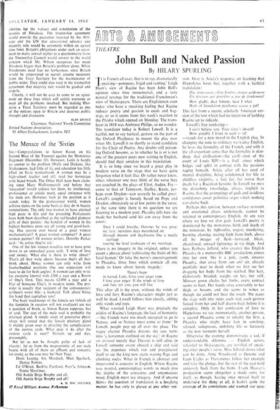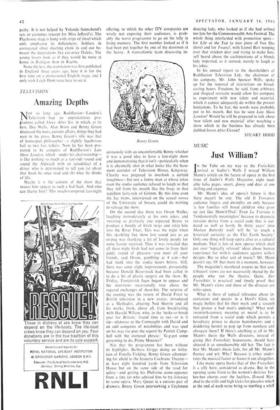[WS YA21E.YTK1E
THEATRE
John Bull and Naked Passion
By HILARY SPURLING
'IT is French all over, that is to say, dramatically speaking—pompous, frigid and ranting.' Leigh Hunt's view of Racine has been John Bull's opinion since time immemorial, and a very natural revenge for the traditional Frenchman's view of Shakespeare. There are Englishmen even today who have a sneaking feeling that Racine reduces poetry and passion to coals and bag- wigs, or so it seems from this week's reaction to the Phedre which opened on Monday. The trans- lator in 1818 was Ambrose Philips, so no wonder. The translator today is Robert Lowell. It is a tactful, not to say tactical, gesture on the part of the Oxford Playhouse to mount the play now when Mr. Lowell is so shortly to stand candidate for the Chair of Poetry. Any doubts still poison- ing Oxford bosoms, as to whether he is or is not one of the greatest poets now writing in English, should find their antidote in this translation.
It is so long since we heard a great play in modern verse on the stage that we have quite forgotten what it feels like. Or rather never knew, since, whatever one may think of the verse they are couched in, the plays of Eliot, Auden, Fry— come to that of Tennyson, Shelley, Keats, per- haps even Dryden—can scarcely be called great. Lowell's couplet is loosely based on Pope and Dryden, obtrusively so at low points in the verse; at the same time there is no question we are listening to a modern poet. Pht.sedra tells how she made her husband send his son away from the court : Then I could breathe, Oenone; he was gone; my lazy, nerveless days meandered on through dreams and daydreams like a stately carriage
touring the level landscape of my marriage. There is no imagery in the original, unless you count a phrase about 'cultivating the fruits of this fatal hymen.' Or take the nurse's encouragement to Phaedra, three lines which contain all one needs to know about heroic tragedy:
There's hope in hatred, Lady. Give your anger rope.
I love your anger. If the winds of love and fury stir you, you will live.
This after all is the crux; without the winds of love and fury Racine's characters might just as well be dead. Lowell follows him closely, adding only winds and rope.
What worried Leigh Hunt was precisely the aridity of Racine's language, the lack of humanity =the French were too much oecupied to go to Nature, and so Nature must come to them.' In Lowell, people pop up all over the place. The vague chariot Phaedra dreams she sees turns into 'a horseman outlined on the sky': in Racine on pretend merely that Theseus is still alive, in Lowell someone swam aboard a ship and said so; the populace which ran and precipitated itself to see the king now starts waving flags and climbing rocks. What in French is abstract and impersonal is concrete in English. Where Racine uses neutral, commonplace words to reach into the depths of the conscious and unconscious mind, English must use imagery. And if anyone thinks the question of translation is a laughing matter, he has only to glance at any other ver- sion. Here is Aricia's response, on learning that Hippolytus loves her, together with a faithful translation:
Que nzon coon-. chere !suzette. ecoute avidement Utz discoars qui peat-etre a pea de londenzentl How gladly, dear Ismene. hear I what
Hath of foundation perchance scarce a jot! This last from a recent, scholarly American ver- sion of the text which had no intention of holding Racine up to ridicule.
Lowell's free rendering—
I can't believe you. Your story's absurd!
How greedily I listen to each v.erd!
—stands for a new mood in the English play. In changing the tone to ordinary woi kaday English, he loses the formality of the French, and with it the all-important sense that the formality is skin- deep, that civilisation—the civili,ation of the court of Louis XIV—is a frail veneer which bulges and splits in contact with the passions raging beneath. Aricia after all has need of mental discipline, being condemned for life to childless virginity, a fate far, far worse than death for a Racinian heroine. In Lowell we miss the disturbing knowledge, always implicit in Racine, that the promptings of gods and insidious confidantes cover primitive urges which nothing can choke back.
Perhaps this tension, between surface restraint and emotional chaos underneath, cannot be retained in contemporary English. At any rate where we lose we also gain. Lowell's poetry is dominated by the monstrous birth and death of the minotaur, by Aphrodite, urgent, murdering, burning, clawing, tearing limb from limb, above all by images of flesh—honeyed, bleak, abandoned, sensual lightnings in the thigh. And here Barbara Jefford, who created this English Phaedra in a memorable BBC production, comes into her own. She is a pale, gaunt, sinuous Phaedra, shut away from sun and air, already painfully near to death when we first see her dragging her body from the sickbed. Her hair, elaborately braided, weighs on her, her stiff, Minoan gown chafes her limbs, every contact seems to hurt. Her hands stray constantly to her thigh or bosom, and she seems to wince as though she could not bear the touch. She paces the stage with tiny steps, each step, each gesture forced from her and half drawn back before it is complete. Only in her confession of love to Hippolytus we see, momentarily, another person, a second Phaedra come to inhabit the first, a Phaedra who might have lain in sunshine, relaxed, voluptuous, imbibing life as furiously as she now torments herself.
Otherwise the evening demonstrates a sad, if understandable dilemma — English actors, schooled to Shakespeare, are terrified of speak- ing other people's verse. Miss Jefford shows what can be done, Anne Woodward as Oenone and Leon Eagles as Theramenes follow her example and take the plunge, but the rest of the cast hold anxiously back from the brink. Frank Hauser's production seems altogether a shade sorry for itself, as though, having once nerved itself to undertake the thing at all, it hadn't quite the courage of its convictions and wanted our syrrt- pathy. It is not helped by Yolande Sonnabend's sets or costumes (except for Miss Jefford's). The Playhouse stage is hung with strips of tinsel which only emphasise its deficiencies. Soldiers in corrugated silver sheeting clank in and out be- tween the decorations like cut-price Daleks. The young lovers look as if they would be more at home in Rattiean than in Racine.
None the less, the translation was first published in England three years ago, here it is for the first time on a protessional English stage, and I only wish Leigh Hunt %Nue here to see it.



































 Previous page
Previous page